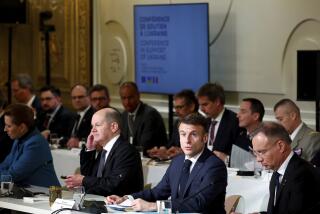NATO Reacts to Gorbachev, Calls for Cuts : Soviet Pledge Hailed; Stage Set for Talks With Warsaw Pact
- Share via
BRUSSELS — NATO allies responded to “new thinking” by the Soviet Union by calling today for massive cutbacks in conventional forces in Europe, with special restrictions on what Moscow could keep on its allies’ soil.
A policy statement was issued after Secretary of State George P. Shultz gave his assessment of Mikhail S. Gorbachev’s plan to withdraw 50,000 men and six tank divisions from East Germany, Czechoslovakia and Hungary.
The declaration on the opening day of a two-day meeting of NATO’s 15 foreign ministers was designed to set the stage for direct negotiations between NATO and the Warsaw Pact early next year.
NATO Hails Announcement
Much of the work on the declaration had been done before Gorbachev made his “restructuring” announcement Wednesday at the United Nations, a move the allies hailed as “a positive contribution.”
The allies, taking a cue from Shultz, did not immediately make a reciprocal gesture, which Gorbachev had urged. Instead, they focused on the enormous advantage the Soviets would retain even after demobilizing 500,000 men over two years as Gorbachev offered.
“The Soviet Union itself possesses more tanks and artillery than all the other members of the Warsaw Pact and the (NATO) Alliance combined,” the statement said. “And they are concentrated in a manner which raises grave concerns about the strategy which they are intended to support.”
The Soviets usually describe their forces in Eastern Europe as defensive. But NATO questioned that stance while also expressing hope “that the new thinking in the Soviet Union will open the way for mutual agreement on realistic, militarily significant and verifiable arrangements which enhance security at lower levels.”
U.S. officials foresee negotiations between NATO and the Warsaw Pact opening within two months, now that the Soviets have made important reforms in human rights. The Reagan Administration had demanded concessions on human rights before moving ahead.
More to Read
Sign up for Essential California
The most important California stories and recommendations in your inbox every morning.
You may occasionally receive promotional content from the Los Angeles Times.













